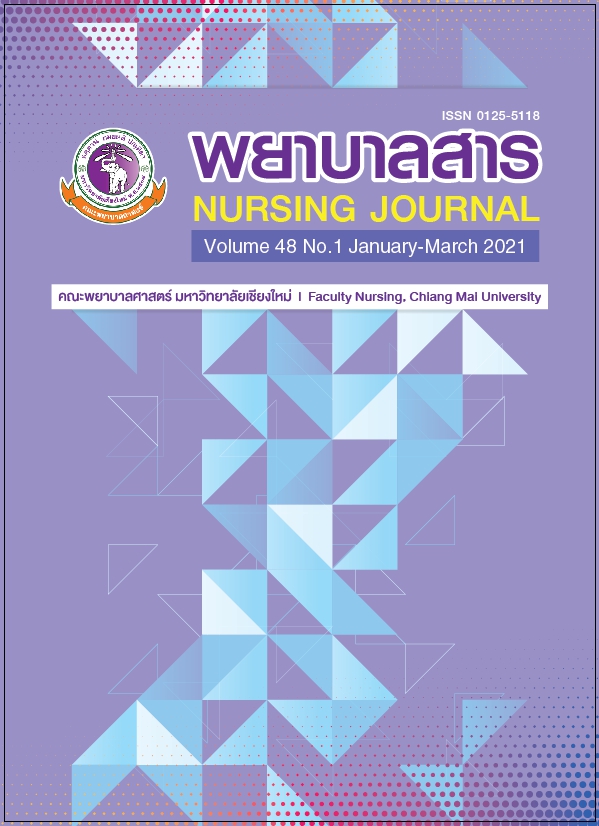‘Lanna’ Local Wisdom in Promoting Well-being of Children: A Pilot Study
Keywords:
Local wisdom, Lanna local wisdom, Child care, Child health promotionAbstract
Lanna local wisdom related to health is knowledge in caring population health focusing on health stability and placing value on holistic health. This pilot study was designed to explore Lanna local wisdom in caring for health promotion of children. Key informants, a total of 52, comprised tradition scholars, traditional healers, and caregivers of children, residing in Chiang Mai Province. Data collection was performed through focus group discussions and in-depth interviews. Data analysis was undertaken by content analysis
The main results of the study illustrated that the spirit beliefs and all kinds of rituals of Lanna people were incorporated to child care for their well-being. Lanna people advanced their children’s readiness in physical, mental, social and spiritual aspects through socialization of family institute along with religion institute, adopting the ‘readiness’ concept and gradually building up children’s knowledge and essential skills for their living. This socialization aimed to enhance their children’s quality growth. Caring for child health promotion comprised caring for social-ethics, spiritual, physical, development, and intelligent. The study reflects that child care of Lanna people focused on the ‘quality’ of child development in all health aspects, which had integrated into daily living as habitual rites. Thorough understanding of local wisdom related to health among health professional is crucial for quality child care plan suitable to Lanna social and cultural context.
References
Ball, J. W., & Bindler, R. C. (2003). Pediatric nursing: Caring for children. (3rd ed.). New Jersey: Pearson Education.
Chompoolong, N. (2005). Local knowledge to learning (revised version). Maha Sarakham: Apichart Printing. (In Thai)
Dudek, S. G. (2001). Nutrition essentials for nursing practice. Philadelphia: Lippinncott Williams & Wilkins.
Government Gazette. (2007). National health act 2007. Retrieved from
https://www.nationalhealth.or.th/sites/default/files/upload_files/hpp_act_ebook58_08_07_453.pdf (In Thai)
Institute for Health Metrics and Evaluation [IHME]. (2017). Global burden of disease.
Retrieved from https://www.khaosod.co.th/lifestyle/news_3043316 (in Thai)
Kuo, A. A., Inkelas, M., Maidenberg, M., Lotstein, D. S., Samson, K. M., & Halfon, N. (2009). Pediatricians’ roles in the provision of developmental services: An international study. Journal of Developmental and Behavioral pediatrics, 30, 331-339.
Leininger, M., & McFarland, M. R. (2002). Transcultural nursing: Concepts, theories, research,
and practice. (3rd ed.). New York: McGraw Hill.
Mistry, K. B., Minkovitz, C. S., Riley, A. W., Johnson, S. B., Grason, H. A., Dubay, L. C., & Guyer, B. (2012). A new framework for childhood health promotion: The role of policies and programs in building capacity and foundations of early childhood health. American Journal of Public Health, 102(9), 1688-1696.
Office of the National Economic and Social Development Board. (2007). National economic
and social development plan No.10 (2007-2011). Retrieved from http://www.ldd.go.th/Thai-html/05022007/PDF/PDF01/index.htm (In Thai)
Office of the National Economic and Social Development Board. (2016). National economic
and social development plan No. 12 (2017-2021). Retrieved from http://wops.moph.go.th/ops/oic/data/20161115144754_1_.pdf (In Thai)
Rew, L., Johnson, R. J., Jenkins, S. K., & Torres, R. (2004). Developing holistic nursing practice.
(5th ed.). New Jersey: Pearson Education.
Sathirapanya, C. (2013). Southern folk knowledge in promoting maternal and child mental health. Songklanakarin Journal of Social Sciences and Humanities, 19(3), 81-120.
(In Thai)
Sorn-Ngai, C. (1991). Feeding patterns and nutritional status of young children in a rural area of Chiang Mai Northern Thailand. (Master Thesis of Medical Science), University of Western Australia.
Taoprasert, S. (2003). Way of health maintenance in the Lanna folk medicine system. Chulalongkorn University Book Center. Wanida Press. (in Thai)
Thailand Nutrition Division. (2004). Baby food. Bangkok: Department of Health, Ministry of Public Health. (In Thai)
Thongsaew, N., Sethabouppha, H., & Chanprasit, C. (2011). “Lanna” local wisdom for health care among people with alcohol dependence. Nursing Journal, 38(3), 110-121.
(In Thai)
Witt, C., Becker, M., Bandelin, K., Soellner, R., & Willich, S. N. (2005). Qigong for schoolchildren: A pilot study. Journal of Alternative and Complementary Medicine, 11, 41-47.
World Health Organization [WHO]. (1986). The Ottawa charter for health promotion.
Retrieved from https://www.who.int/healthpromotion/conferences/
previous/ottawa/en/
World Health Organization [WHO]. (2019). Children: Reducing mortality. Retrieved from
https://www.who.int/news-room/fact-sheet s/detail/children-reducing-mortality.
Downloads
Published
How to Cite
Issue
Section
License
บทความที่ได้รับการตีพิมพ์เป็นลิขสิทธิ์ของวารสารพยาบาลสาร
ข้อความที่ปรากฏในบทความแต่ละเรื่องในวารสารวิชาการเล่มนี้เป็นความคิดเห็นส่วนตัวของผู้เขียนแต่ละท่านไม่เกี่ยวข้องกับมหาวิทยาลัยเชียงใหม่ และคณาจารย์ท่านอื่นๆในมหาวิทยาลัยฯ แต่อย่างใด ความรับผิดชอบองค์ประกอบทั้งหมดของบทความแต่ละเรื่องเป็นของผู้เขียนแต่ละท่าน หากมีความผิดพลาดใด ๆ ผู้เขียนแต่ละท่านจะรับผิดชอบบทความของตนเองแต่ผู้เดียว






